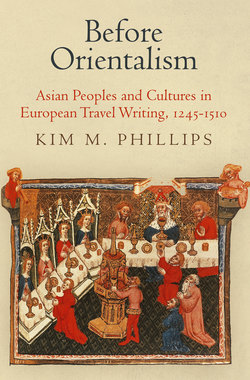Before Orientalism

Реклама. ООО «ЛитРес», ИНН: 7719571260.
Оглавление
Kim M. Phillips. Before Orientalism
Отрывок из книги
Before Orientalism
Ruth Mazo Karras, Series Editor
.....
Western Europeans did not suddenly develop a new, Orientalist sensibility in the early sixteenth century. A problem for early modern and modern historians is to identify at what point it becomes possible to speak of Orientalism as an explanatory framework for European writings about India and the far East. Joan-Pau Rubiés, for example, denies that the concept is adequate for describing Portuguese writing on India up to the end of the sixteenth century.58 Robert Markley also demonstrates that laudatory perspectives on China remained powerful right through the sixteenth and seventeenth centuries.59 Both China and Japan, partly as a result of Jesuit influence that sought to emphasize those nations’ high levels of civilization and rationality, remained the subject of European admiration at least until the early eighteenth century.60 It appears that the late nineteenth and early twentieth centuries are the best available candidates for the high-water mark of Orientalism, in all senses of the word. Stereotyping, homogenizing, and demonizing became regular, but never inevitable, features of western discourse on far eastern regions only from the early eighteenth century. They were never more than part of the story, yet assertions of European superiority such as Samuel Purchas’s in 1613 (quoted below, pp. 63–64) may indicate the beginning of a sea change. His claims for European greatness are illustrative of the profound shift in consciousness wrought by European exploration and conquest of the late fifteenth and sixteenth centuries. That supreme secular self-confidence or ethnocentrism has few distant echoes in the writings of our medieval travelers (discussed further in Chapter 3), though confidence in religious rightness was second nature to medieval Latin Christians.
Orientalism”s lasting value is not in providing the answers but in offering a starting point for scholarship that can provide textured accounts of the complicated and many-layered views “westerners” of different eras have formed of Asian cultures. They have been wondering, curious, admiring, inquiring, envious, avaricious, possessive, superior, censorious, denigrating, stereotyping, and demonizing but not generally all at the same time. Medieval travelers knew nothing of the world that would succeed them. They could never have envisaged the extraordinary European takeover of later centuries. To them, Mongolia, China, the Indian subcontinent, Burma, the kingdom of Champa (southern and central Vietnam), and the multitudinous islands scattered across the ocean at the farthest reaches of their known earth represented new and fascinating worlds meriting diverse responses. The peoples of these places were variously regarded with fear, disdain, wonder, and awe and were the focus of wariness, curiosity, and pleasure. Conspicuously absent from medieval western responses to Asia was the urge so familiar in more recent times: the desire to possess.
.....